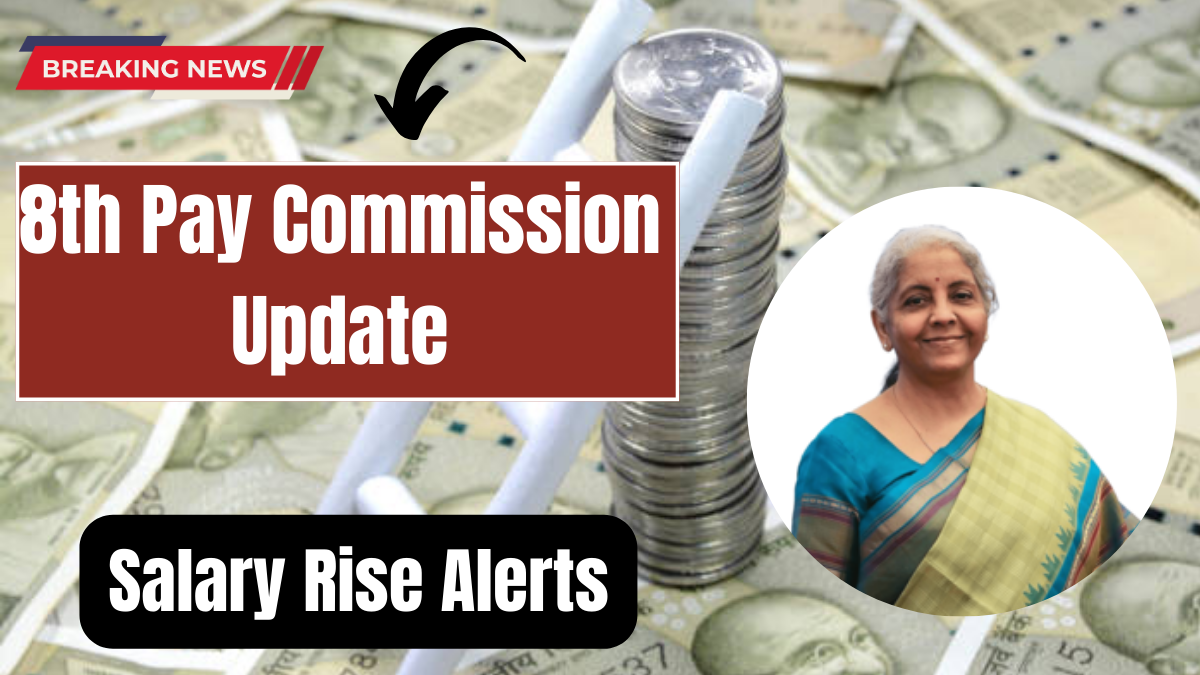The 8th Pay Commission is a crucial development for central government employees and pensioners in India. Approved in January 2025, the commission is expected to come into effect in January 2026. It aims to provide fair compensation by increasing salaries and pensions, aligned with the increasing cost of living and inflation rates. This reform will impact both current employees and retired personnel, ensuring better financial security and enhanced living standards.

Objectives of the 8th Pay Commission
The primary goals of the 8th Pay Commission include:
-
Providing financial security to government employees by raising their salaries.
-
Addressing the impact of inflation and rising living costs.
-
Enhancing the standard of living for both employees and pensioners.
-
Promoting economic welfare and improving productivity among government workers.
The government aims to boost the motivation and efficiency of its workforce by ensuring their compensation is reflective of the rising cost of living.
Implementation Timeline
The 8th Pay Commission is scheduled to be implemented by January 2026. This revision will replace the 7th Pay Commission, which was introduced in 2016. Typically, the government reviews pay structures every ten years, and the 8th Pay Commission marks the continuation of this policy.
Process Overview:
-
Committee Setup: A committee will be formed to evaluate salary structures and allowances.
-
Recommendations: The committee will make recommendations to the government based on the current economic conditions.
-
Implementation: After reviewing the recommendations, the government will implement the revised pay scales.
What Is the Fitment Factor Under the 8th Pay Commission?
The fitment factor is a critical element that determines how much employees’ salaries will increase. It acts as a multiplier to adjust the basic salary and calculate the revised pay scale.
-
The expected fitment factor for the 8th Pay Commission is 2.86, which is higher than the 2.57 factor used in the 7th Pay Commission.
| Pay Commission | Fitment Factor | Minimum Basic Salary |
|---|---|---|
| 7th Pay Commission | 2.57 | ₹18,000 |
| 8th Pay Commission (Expected) | 2.86 | ₹51,480 |
This higher fitment factor will lead to a significant salary increase for all central government employees.
Expected Minimum Salary Hike
Currently, the minimum salary for central employees under the 7th Pay Commission is ₹18,000. With the new fitment factor of 2.86, the minimum salary is expected to rise substantially.
Projected Salary Calculation:
Revised Salary=Current Salary×Fitment Factor\text{Revised Salary} = \text{Current Salary} \times \text{Fitment Factor}
For example, if an employee’s basic salary is ₹20,000, the revised salary would be:
20,000×2.86=₹57,20020,000 \times 2.86 = ₹57,200
Thus, the minimum salary for central employees could rise from ₹18,000 to ₹51,480. Employees with a salary above ₹20,000 may see their earnings exceed ₹40,000 per month, especially when allowances and benefits are considered.
Pension Increment Under the 8th Pay Commission
The 8th Pay Commission also includes significant increases for pensioners. Using the same fitment factor of 2.86, pensioners will see a substantial increase in their pensions.
| Current Pension | Projected Pension (8th Pay Commission) | Increase (%) |
|---|---|---|
| ₹9,000 | ₹36,000 | 300% |
| ₹37,440 | ₹77,068 | 108% |
These increases will provide better financial stability for retired government employees, ensuring that their pensions are sufficient to meet rising living expenses.
DA Revision Under the 8th Pay Commission
The Dearness Allowance (DA) is an essential part of the salary structure, designed to compensate for inflation. Under the 8th Pay Commission, the DA rate is expected to increase from DA112 to DA113, with further adjustments made periodically.
| Aspect | 7th Pay Commission | 8th Pay Commission (Expected) |
|---|---|---|
| Basic Salary | ₹18,000 | ₹36,000 |
| Minimum Pension | ₹9,000 | ₹18,720 |
| DA Rate | DA112 | DA113 |
This DA revision will enhance the overall income of government employees, particularly pensioners who rely heavily on these payments.
How To Calculate Salary Under the 8th Pay Commission
To calculate the revised salary, the formula is simple:
New Salary=Existing Basic Salary×Fitment Factor\text{New Salary} = \text{Existing Basic Salary} \times \text{Fitment Factor}
For example, if an employee’s current salary is ₹30,000, the new salary would be:
30,000×2.86=₹85,80030,000 \times 2.86 = ₹85,800
There are also online calculators available that allow employees to input their current salary structure and calculate the new pay accurately.
Benefits of the 8th Pay Commission
The 8th Pay Commission offers several benefits to both central government employees and pensioners:
-
Significant Salary Hike: Increased income due to a higher fitment factor and DA revisions.
-
Improved Pensions: Pensioners will enjoy enhanced financial security.
-
Better Living Standards: Salary increments aligned with inflation and rising living costs.
-
Motivation and Productivity: Improved morale among government employees, leading to higher productivity.
FAQs
Q1: What is the expected minimum salary under the 8th Pay Commission?
The minimum salary under the 8th Pay Commission is expected to rise significantly, with employees likely seeing a minimum salary of ₹51,480, up from ₹18,000.
Q2: When will the 8th Pay Commission be implemented?
The 8th Pay Commission will be implemented by January 2026, replacing the 7th Pay Commission.
Q3: How is the pension calculated under the 8th Pay Commission?
Pensions will be calculated using the same fitment factor of 2.86, leading to substantial increases in pension amounts for retirees. For example, a ₹9,000 pension will increase to ₹36,000.
Q4: What is the fitment factor under the 8th Pay Commission?
The fitment factor under the 8th Pay Commission is 2.86, which is higher than the 2.57 factor used in the 7th Pay Commission.
Q5: Will the 8th Pay Commission apply to pensioners as well?
Yes, the 8th Pay Commission will apply to both current employees and pensioners, with significant increases in pensions as well.
Click here to know more.
Aanchal is a passionate writer with a keen interest in storytelling, content creation, and creative expression. She enjoys exploring diverse topics and crafting engaging narratives that captivate readers.

